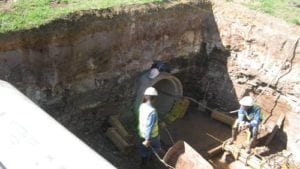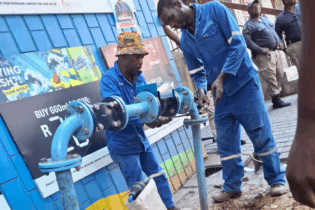Phase 1 of the Libode Water Supply Project, which includes the construction of bulk mains and reservoirs, is currently under construction and will be completed by December 2013, Nokuphumula Mkhwanazi, technical executive at GIBB tells Chantelle van Schalkwyk.
“The existing setup is not reliable as the communities continually experience water supply interruption and, as a result, OR Tambo District Municipality identified the need to consolidate water supply to Libode Town and the surrounding villages,” explains Mkhwanazi. He adds that often the communities end up reverting to local rivers for water due to these interruptions. “This scheme therefore seeks to address these interruptions and afford communities of Libode Town and villages a reliable water supply.” The Rosedale Extension to the Libode Water Supply Project was approved under the presidential intervention as an emergency water supply scheme. The main aim of the project is to augment the existing water supply in Libode and at the same time provide the neighbouring villages with potable water. “The current population of 31 815 has been allowed for in the planning of the project. This figure is expected to grow up to 35 152 by 2033. A total of 33 villages will benefit from this scheme,” says Mkhwanazi. GIBB was appointed as the lead consultant on the project and is currently working with SMME sub-consultants. “This scheme will improve the reliability and assurance of water supply to the project area providing a much needed additional water source to the surrounding suburb areas of Mthatha and Libode, thus relieving the pressure from the Thornhill Water Treatment Works.” The bigger picture The town of Libode, in South Africa’s Eastern Cape is situated on the R61 road from Port St Johns to Mthatha and serves as the administrative seat of the Nyandeni Local Municipality, which is part of the OR Tambo District Municipality .The district municipality is the water services authority responsible for the provision of water services to the area under its jurisdiction. “A few planned urban developments around Mthatha are also included in the sizing of the major components. Their inclusion into the scheme forms part of a bigger picture, to upgrade and provide adequate, uninterrupted potable water to the current and future residents of Mthatha,” says Mkhwanazi. The proposed urban developments are located in a radius of approximately 5 km north of the Mthatha CBD, astride both the east and west side of the N2 to Kokstad. As a result, the overall project scope includes the raw water abstraction works from the Mthatha Dam, provision of new 30 Mℓ water treatment works, construction of bulk pipelines from Rosedale to Libode and on to its surrounding villages and storage reservoirs. Mkhwanazi explains that a phased approach was taken towards the project, with the roll-out of the scheme divided into three phases:- Phase 1 consists of the construction a bulk gravity pipeline and a rising main to convey water from a proposed 30 Mℓ water treatment works at Rosedale to Libode town and villages. The salient quantities include 34 km of pipeline (700 mm, 600 mm, 300 mm and 200 mm diameters), one Pump station and three reservoirs.
- Phase 2 will be the construction of a 30 Mℓ water treatment plant in Rosedale, including raw water abstraction from the Mthatha Dam.
- Phase 3 will provide reticulation from the tee-off to reservoir R532 to the rest of the rural villages to the east of Libode. This phase will consist of the construction of 40 km of pipeline and eight storage reservoirs
“SMME contractors have been given opportunities to be mentored by large construction companies as the project is packaged in such a manner as to promote development of SMMEs. The suppliers of glass reinforced pipes (GRP) deployed their skilled personal to assist and mentor the contractors in pipe laying. Engineering graduates have also been given opportunity to gain experience on design of various components and also on-site monitoring as assistant resident engineers.”
According to Mkhwanazi, most subcontractors are from the OR Tambo District Municipality and the suppliers are from within the Eastern Cape, therefore creating the economic growth and development through infrastructure development. About 300 people will be employed on-site at the peak of the project. Another impact on the local community has been as a result of the fact that the majority of land through which the scheme is constructed is considered as tribal (state) land, which is under the authority of traditional authorities, explains Mkhwanazi.“Consultation and negotiation was required with the appropriate role players and authorities during the detailed design stage and during construction to obtain permission for construction and to deal with issues of compensation for any loss of productive land.” In addition, the process was further facilitated through the engagement of social facilitators, ward councillors and chiefs. The local community is also set to benefit from having safe portable water for consumption and the provision of water unlocks socio-economic development, adds Mkhwanazi. In addition, the housing developments in Libode and surrounding villages, which is largely dependent on the provision of water and sanitation infrastructure, will be fast tracked. Project prowess During the construction stage, the highlights of the project included getting SMME contractors and big contractors to work and deliver within the programme and budget, says Mkhwanazi. Another highlight for him was overcoming the social challenges and “enabling that every local community along the pipe route benefits in job creation”, as well as the mentorship of graduates. On-site innovation has been utilised in the specialised installation of GRP pipe joints, which according to Mkhwanazi, involved an innovative installation process. The use of an underground water drain in wetland areas with high water tables, which consisted of granite coarse stone laid below the bedding so as to create a soaker way system in order to drain away water from the pipe trenches, can also be considered innovative. However, this does not mean the project was without its own unique challenges – especially relating to the unique local environment. An environmental specialist was employed to conduct a basic assessment so as to respond to the ecology and sensitive areas, and as a result, certain sensitive areas such as graves, wet lands and flora were identified and had to be avoided during pipe route selection. “In certain cases this affected the route negatively as long length route options had to be used in order to avoid these areas,” says Mkhwanazi, adding that on river crossings, authorisation and sound engineering solutions where applied. A unique perspective What made GIBB particularly suited for the project, says Mkhwanazi, is that “GIBB is uniquely experienced in the nature of the project through its expertise in bulk water master planning and its vast track record and knowledge of the project area after having conducted a master plan report for the project area”. There are a few key lessons learnt that Mkhwanazi will be implementing on future projects, most important of which is integrated planning, which takes cognisance of the present, medium- and long-term scenarios for water demand and evaluation of the possible socio-economic impacts being carried out in an optimal manner, that creates value for money and sustainability.






